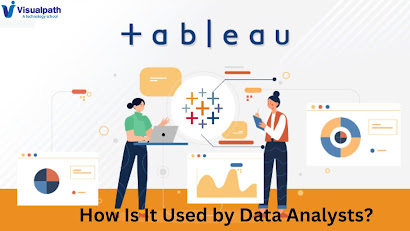Tableau and How is it Used by Data Analysts?
Introduction:
Data
analysts are
skilled professionals who specialize in interpreting, managing, and analyzing
data to extract valuable insights and inform decision-making processes within
organizations. In
today's data-driven world, extracting actionable insights from vast amounts of
information is paramount for businesses to make informed decisions and gain a
competitive edge. However, interpreting raw data can be challenging without the
right tools. - Data
Analytics Online Training
Understanding
Tableau:
Tableau is a
powerful and intuitive data
visualization tool that enables users to create interactive and dynamic
dashboards, reports, and visualizations from various data sources. Founded in
2003, Tableau has quickly become a leading choice for organizations of all
sizes to analyze and visualize their data effectively. - Data
Analytics Training in Ameerpet
At its core,
Tableau's strength lies in its ability to simplify complex data and present it
in a format that is easy to understand and interpret. With a user-friendly
interface and a wide range of visualization options, Tableau empowers users to
explore data, uncover patterns, and gain insights that drive better
decision-making.
How Data Analysts
Use Tableau:
Data
analysts play a crucial role in transforming raw data into meaningful insights
that drive business growth and innovation. Tableau serves as a valuable tool in
the data analyst's toolkit, offering a host of features and functionalities
that streamline the data analysis process.
Data Connection and
Integration: Tableau allows data analysts to
connect to various data sources, including databases, spreadsheets, and cloud
services, without the need for complex coding. This seamless integration
enables analysts to access and analyze data from multiple sources in one
centralized platform. - Data
Analytics Course in Hyderabad
Visual Exploration: With
Tableau's drag-and-drop interface, data analysts can quickly create interactive
visualizations such as charts, graphs, maps, and dashboards. These
visualizations provide a comprehensive view of the data, making it easier to
identify trends, outliers, and correlations.
Data Analysis and
Calculation: Tableau offers powerful analytical
capabilities, allowing data analysts to perform calculations, aggregations, and
statistical analysis on the fly. Whether it's calculating key performance
indicators (KPIs), creating custom calculations, or conducting advanced
statistical analysis, Tableau empowers analysts to derive deeper insights from
their data. - Data
Analytics Training
Dashboard Creation: Tableau's
dashboarding functionality enables data analysts to combine multiple
visualizations into interactive dashboards that tell a cohesive story. These
dashboards can be customized and shared with stakeholders, allowing for
effective communication of insights and findings.
Collaboration and
Sharing: Tableau facilitates collaboration
among data analysts and stakeholders by providing features for sharing,
commenting, and annotating visualizations. Whether it's sharing dashboards via
Tableau Server or publishing interactive reports to Tableau Public, analysts
can easily disseminate insights to decision-makers across the organization.
Conclusion:
In
conclusion, Tableau is a versatile and indispensable tool for data analysts
seeking to unlock the full potential of their data. By enabling intuitive data
visualization, seamless data integration, and powerful analysis capabilities,
Tableau empowers analysts to uncover actionable insights that drive business
success.
Visualpath is the Leading and Best Institute for learning Data Analytics
Online in Ameerpet, Hyderabad. We provide Data Analytics Online Training Course, and you will get the best course at an affordable cost.
Attend Free Demo
Call on - +91-9989971070.
Visit : https://www.visualpath.in/data-analytics-online-training.html
WhatsApp : https://www.whatsapp.com/catalog/919989971070/



Comments
Post a Comment